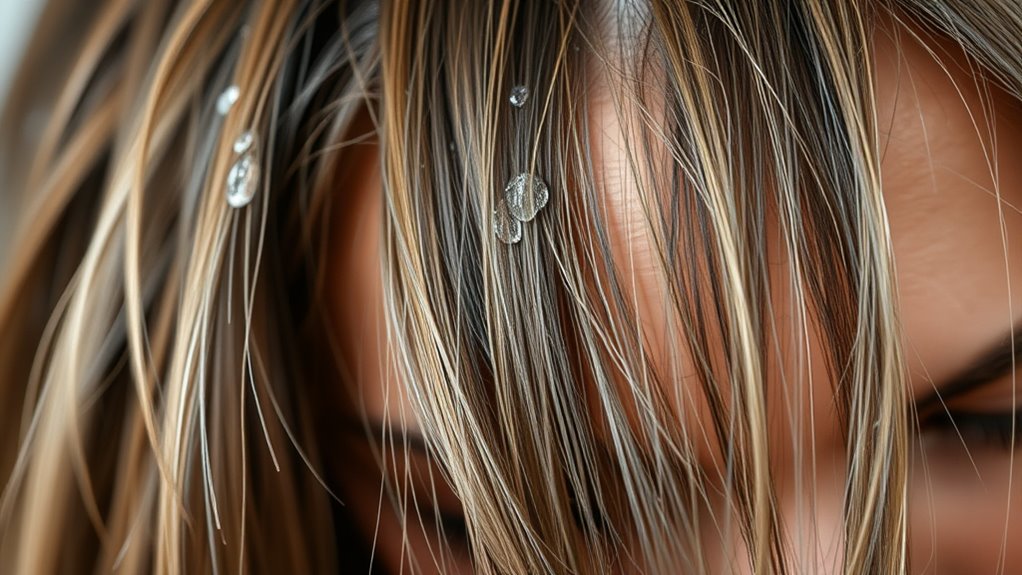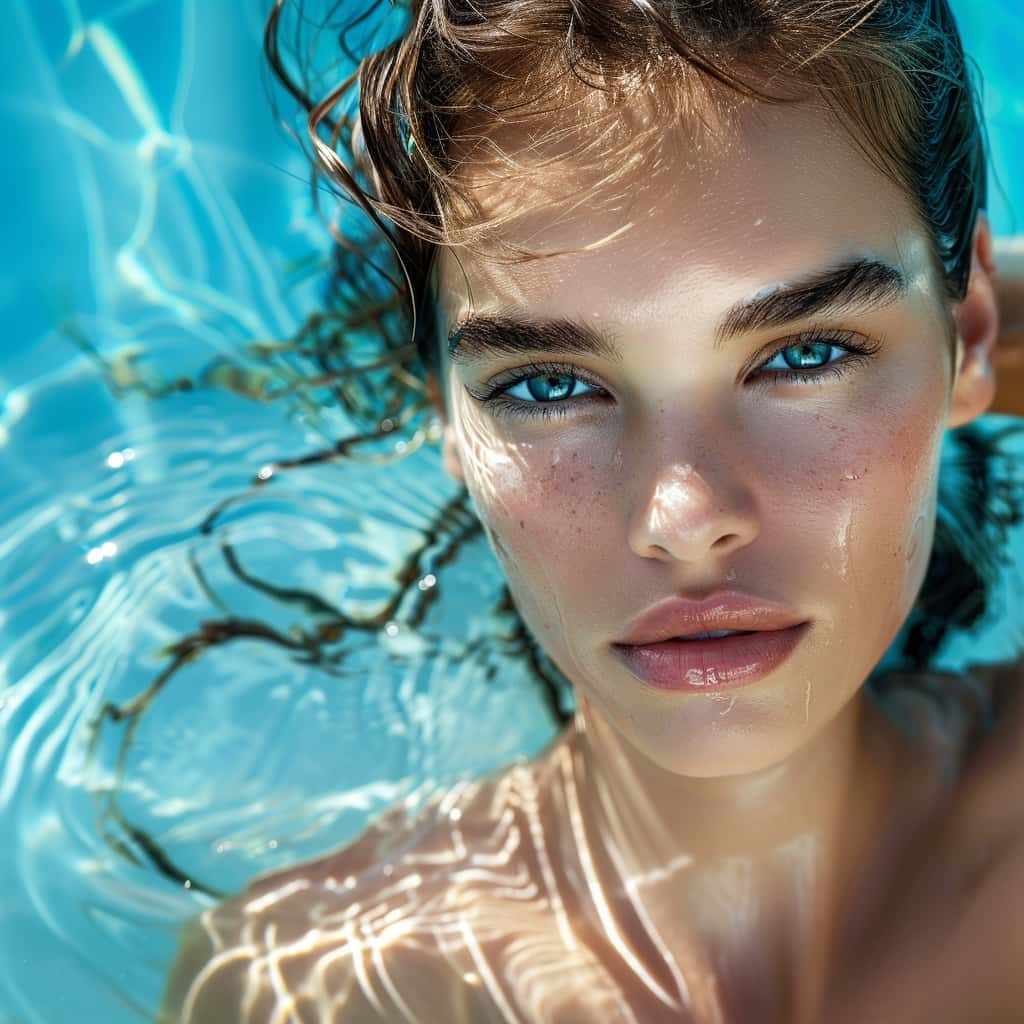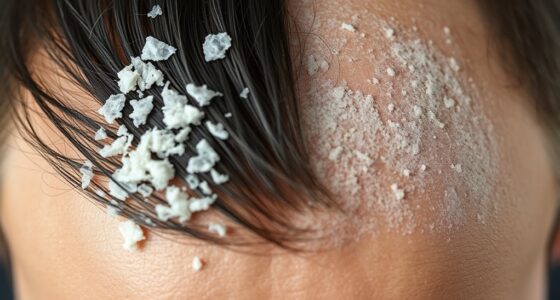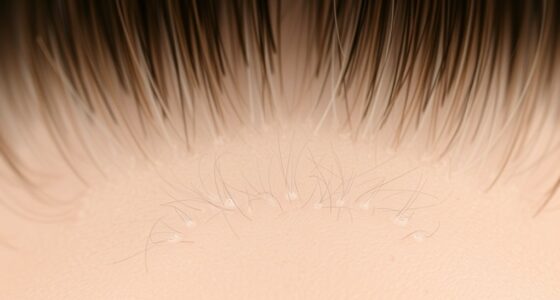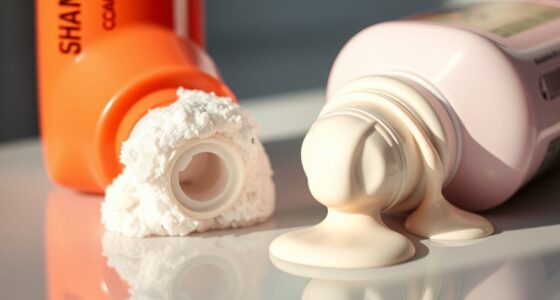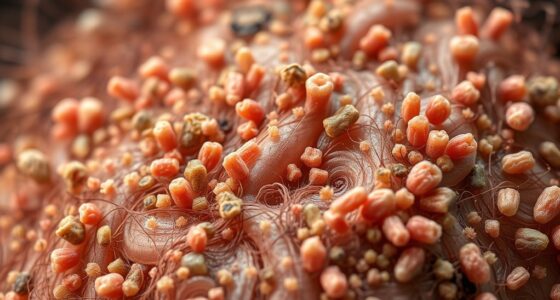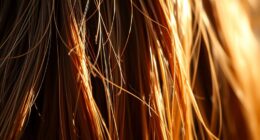If you notice your hair feels heavy, looks dull, and tangles easily, hard water may be the cause. Mineral buildup roughs up your hair cuticles, making it brittle and less soft after washing. You might see increased frizz or roughness and find your usual products less effective. To fix this, consider using chelating shampoos, installing water softeners, and deep conditioning regularly. Keep going to discover more ways to protect your hair from hard water damage.
Key Takeaways
- Dull, weighed-down hair with increased tangling indicates mineral buildup from hard water.
- Mineral deposits roughen the hair cuticle, reducing moisture absorption and causing dryness and brittleness.
- Signs include rough texture, less softness, and visible mineral residue on hair strands and scalp.
- Using chelating shampoos, installing water softeners, and deep conditioning help remove deposits and restore health.
- Early detection and preventive measures preserve hair shine, softness, and overall resilience against hard water damage.
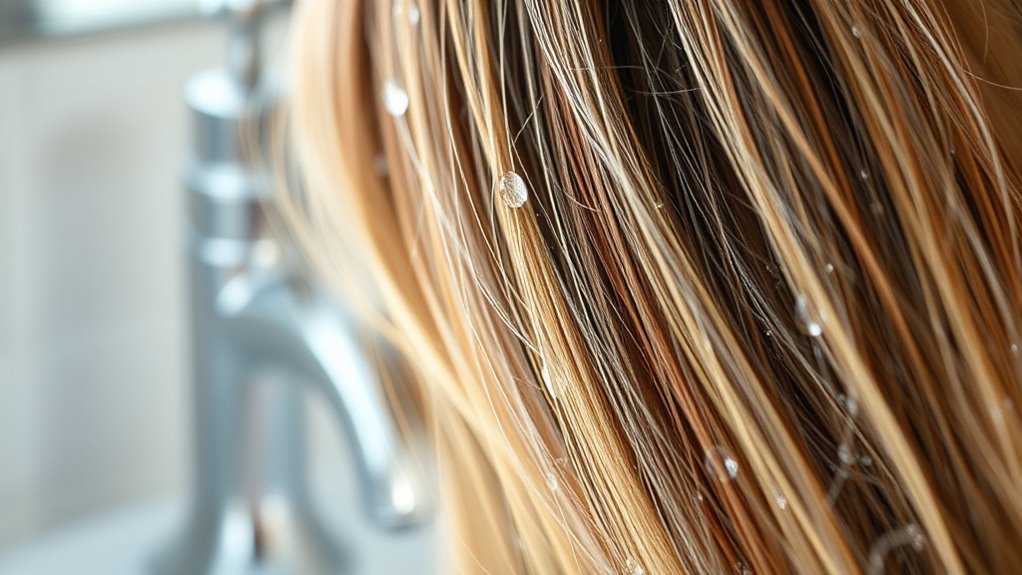
Have you ever wondered how hard water affects your hair? When you wash your hair with water high in minerals like calcium and magnesium, those minerals don’t just wash away—they cling to your strands. This mineral buildup can make your hair feel heavy, look dull, and become more prone to tangling. Over time, this accumulation can lead to real hair damage, weakening the strands and making them more susceptible to breakage. It’s a slow process, but the effects are noticeable once your hair starts losing its shine and softness. You might find that it takes more effort to style your hair, or that it feels rough and brittle even after washing.
Mineral buildup from hard water doesn’t just stay on the surface; it penetrates the hair cuticle, causing it to become rough and less flexible. This roughness prevents moisture from penetrating the hair shaft, leaving your hair dry and prone to split ends. The damage caused by these minerals can also interfere with your hair’s natural oils, disrupting the scalp’s balance and leading to dryness or even scalp irritation. If you notice that your hair feels weighed down or that your usual products aren’t as effective, hard water might be the culprit. The minerals can create a barrier that prevents shampoos and conditioners from working properly, further exacerbating hair damage and making your hair appear dull and lifeless.
Mineral buildup roughens hair cuticles, causing dryness, dullness, and reduced product effectiveness.
Dealing with mineral buildup isn’t just about aesthetics; it’s about protecting your hair’s health. You might consider using chelating shampoos designed specifically to remove mineral deposits or switching to clarifying treatments more often. Installing a water softener or using a shower filter can markedly reduce mineral content in your water, helping to prevent the buildup before it starts. Regular deep conditioning treatments are also beneficial, as they help restore moisture and smooth the cuticle, reducing the roughness caused by mineral deposits. Additionally, avoiding excessive heat styling and harsh chemical treatments can minimize further damage, keeping your hair resilient against the effects of hard water.
Understanding how hard water impacts your hair empowers you to take proactive steps to protect it. Recognizing the signs of mineral buildup and damage allows you to adapt your hair care routine accordingly. Incorporating water softening solutions and gentle hair products can make a significant difference in maintaining healthy, shiny hair despite the challenges posed by hard water. With the right precautions—like water softening solutions, gentle shampoos, and nourishing treatments—you can restore your hair’s vitality and enjoy healthier, shinier locks despite the challenges posed by hard water.
Frequently Asked Questions
Can Hard Water Cause Permanent Damage to Hair?
Yes, hard water can cause permanent damage to your hair if mineral deposits build up over time. When mineral deposits accumulate, they increase your hair’s porosity, making it fragile and prone to breakage. This damage can be long-lasting, especially if you don’t address the hard water issue early on. To protect your hair, consider using clarifying shampoos and water softening solutions, and avoid excessive exposure to hard water.
Are There Specific Hair Types More Affected by Hard Water?
Yes, your hair type influences how hard water affects you. High porosity hair absorbs minerals more easily, making it prone to damage and dryness. If your hair has low porosity, minerals from hard water may sit on the surface, causing buildup and dullness. Understanding your hair porosity helps you choose effective treatments, like clarifying shampoos or deep conditioners, to protect your hair from hard water’s damaging effects.
How Often Should I Detox My Hair From Mineral Buildup?
Think of your hair as a sponge soaking up minerals—it needs a good rinse every so often. You should detox your hair from mineral buildup once a month if you have hard water, or more frequently if you notice dullness or scalp irritation. A hair detox helps remove stubborn mineral deposits, restoring shine and softness. Regular detoxing keeps your hair vibrant and healthy, preventing the mineral buildup from turning into a permanent stain.
Do Natural Remedies Effectively Combat Hard Water Effects?
Natural remedies can help combat hard water effects by reducing mineral buildup on your hair. Ingredients like apple cider vinegar, lemon juice, and baking soda can be effective in breaking down minerals and restoring your hair’s natural shine. You should try rinsing with diluted apple cider vinegar or using a baking soda paste once a week. While they may not completely eliminate mineral buildup, natural remedies are a gentle, affordable way to improve your hair’s health.
Can Switching Water Sources Improve Hair Health Long-Term?
Switching water sources can improve your hair health long-term. For example, using water filtration systems reduces mineral buildup, leading to softer, shinier hair. This change minimizes damage from hard water, making your hair easier to manage and less prone to breakage. Incorporate hair treatments that complement this switch, like deep conditioning, to enhance results. Ultimately, choosing a cleaner water source supports healthier hair over time.
Conclusion
Think of your hair as a delicate garden, thriving with the right nourishment. Hard water is like a stubborn weed, slowly choking your plants’ beauty. But armed with the right solutions—like gentle washes and protective treatments—you can clear the weeds and let your hair bloom again. Don’t let hard water be the villain in your hair’s story. Take control, nurture your scalp, and watch your hair flourish like a vibrant, thriving garden.
Claire has a knack for turning complex dermatological concepts into engaging, easy-to-understand articles. Her work primarily focuses on creating detailed reviews and thought-provoking articles in the “Vetted” category. Claire’s writing not only informs but also inspires our community to try new skincare solutions.
